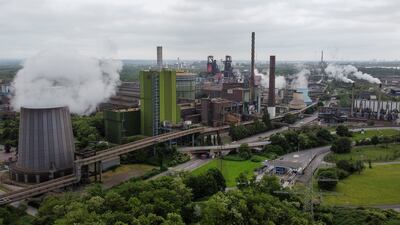Anti-immigration party Alternative for Germany (AfD) has reached a new high in national opinion polls amid rising discontent among voters over the government’s climate agenda.
The nationalist group would win 18 per cent of the vote if elections were held tomorrow, a new survey showed.
The results of the most recent survey by national broadcaster ARD were the strongest performance for the AfD, putting it level with the Social Democrats.
The conservative CDU-CSU was given 29 per cent of the vote.
Only one in five voters who took part in the poll said they were satisfied with the work being done by Chancellor Olaf Scholz's coalition.
The AfD topped polls in the eastern regions of Saxony, Thuringia and Brandenburg.
While the group continues to push its anti-immigration message to voters, experts say it is capitalising on voter dissatisfaction over Berlin’s climate agenda and a painful cost-of-living crisis sparked by Russia’s invasion of Ukraine.
Almost two in three of the party's voters named immigration as a reason for choosing the AfD in the ARD poll.
Since its inception in 2013, AfD has grown rapidly and now has 78 seats in the German parliament, the Bundestag.

The far-right group still plays on public anger over former chancellor Angela Merkel's 2015 decision to admit a wave of asylum seekers from conflict-torn countries like Syria, Afghanistan and Iraq.
The country’s three-way coalition, governed by Mr Scholz, has of late been wracked by infighting over energy plans.
Members of the alliance – made up of Mr Scholz’s Social Democrat party, Greens and liberals – have traded blows over a plan put forward by the Green-led economy ministry to ban new fossil fuel boilers and reduce emissions.
The proposed move has been eviscerated by parts of the German media, including the popular tabloid Bild, which branded it a “heating hammer” for consumers.
Jakob Guhl, a researcher at the Institute for Strategic Dialogue who monitors far-right content, told The National that some of the AfD’s most popular online traffic involved slating the Greens.
“The AfD is able to create this narrative around elite metropolitan liberals ruling against the interests of regular people by recklessly supporting Ukraine, by imposing sanctions that damage the German economy, by pursuing pie-in-the-sky environmentalist programmes,” he said.
Ursula Muench, political scientist at the Bundeswehr University Munich, said the far-right party “has discovered the topic of climate protection for itself”.
The AfD is succeeding in “mobilising and creating a mood” by targeting the government's supposedly costly climate agenda for criticism, Ms Muench said.
She said that the far-right faction in the Bundestag had done better than the main opposition CDU at capitalising on “resentment and lack of understanding about the heating law”.
The AfD won nearly 13 per cent of the vote in the 2017 general election, catapulting the party into the Bundestag, before it fell back to 10 per cent in the last national vote in 2021.
“Voters are seeing where the value-based politics of the Greens is leading us, namely, to economic war, inflation and deindustrialization,” Tino Chrupalla, co-leader of the AfD, told the Funke media group.


